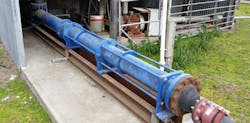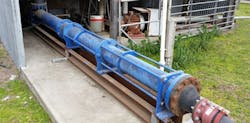New Zealand farms improve demanding effluent transfers with progressing cavity pump
Nov. 27, 2014 -- NOV Mono, a progressing cavity pump manufacturer, has provided a Mono progressing cavity pump to Castle Glen Farms in the town of Foxton, New Zealand, that will replace a number of centrifugal pumps in an effort to transfer animal effluent over considerable distances. The farms had previously been using a number of different centrifugal pumps to deliver pig, cow and sheep effluent through a 4-inch-diameter pipe, over a distance of 3.7 km to be used for irrigation.
"Replacing these with a single Mono pump has allowed us to supply several irrigators, which are located over the length of the pipework, and still deliver the same pressure and flow rate at every nozzle, while also reducing our energy costs," said Castle Glen's Rob Mather. "We were also able to use our existing power supply and not have to upgrade the transformer to cope with a different power requirement."
The pump chosen was the Mono Epsilon E1AD, operating at 12 bar and 120 RPM and delivering 35 cubic meters of effluent each hour. These pumps offer proven solutions for this type of application and are designed to create significant cost savings by allowing the use of small-bore pipework when pumping over long distances or with high-head requirements.
Accordingly, the pumps can be used for many different types of duty including domestic, industrial and agricultural effluents, industrial chemicals and detergents, mine dewatering, crude oil, and starch slurries. Their smooth progressing cavity action also makes them ideal for handling shear-sensitive substances such as emulsions.
The Epsilon pumps also feature Mono's Flexishaft drive shaft connection, which eliminates wearing components between the drive-end and pumping element. As no lubrication is required, the likelihood of product contamination is eliminated. A low running speed capability also reduces wear rates and extends both the pumps' maintenance intervals and overall working life. Available in cast iron or stainless steel, they also offer a choice of rotor and stator materials, which further extend their versatility.
See also:
"Progressing cavity pumps help improve sewage handling operation on Caspian Sea drilling rig"
"UK wastewater treatment plant receives progressing cavity pump to help improve water quality"
About NOV Mono Group
NOV Mono is a division of National Oilwell Varco. It comprises a group of specialist companies offering progressing cavity pumps, artificial lift systems, industrial mixers, heat exchangers, grinders, screens and aftermarket replacement parts and services, across a broad spectrum of industrial sectors including water and wastewater, oil and gas, chemical, pulp and paper, food and beverage and agriculture. The company first began manufacturing progressing cavity pumps in 1935 and industrial mixers in 1952, giving it a heritage of over 75 years. For more information, visit www.mono-pumps.com.
###

